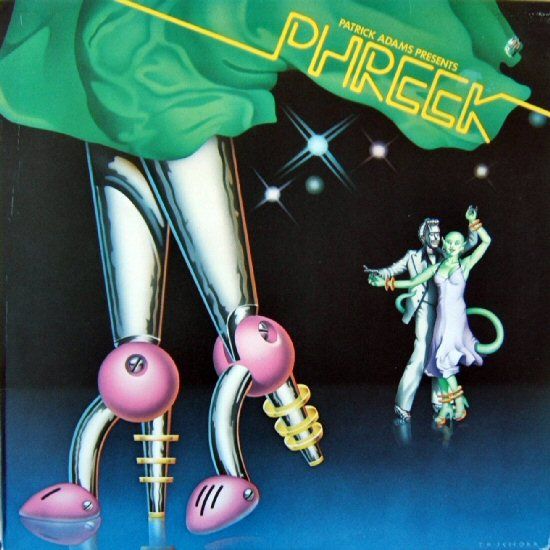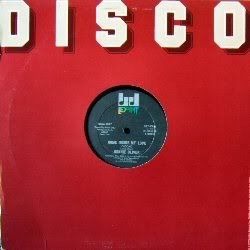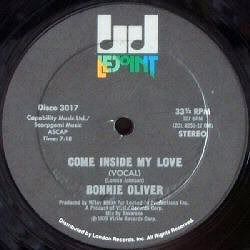

Phreek - Weekend
Phreek - Weekend (Promo 12" Version)
Phreek - Everybody Loves A Good Thing
Phreek - May My Love Be With You
Phreek - Much Too Much
Phreek - I'm A Big Freak (R U 1 2)
Phreek - Have A Good Day
I know I'm long overdue for a Patrick Adams entry, I'm not sure why it took me this long since Patrick Adams was one of the first producers I got into when I started collecting disco.. Even before that, Musique's "In The Bush" was one of my first favourite disco records as heard on one of my parents' cheapo K-tel 8 tracks. I remember when I finally got it, I played the hell out of that first Musique album, first on LP and then on CD..
Anyway, Patrick Adams hardly needs an introduction since he is already widely recognized as one of the most brilliant and prolific producers to ever come out of disco. The word 'genius' has often been used to describe him and given his prodigious talent, prolific output, distinct sound and of course the great material that has resulted, it's no wonder why. Granted someone who was as prolific as he was (and I'm not yet even close to hearing even a significant fraction of his output), is bound to have some duds to his name, yet when he was good, he could be downright brilliant. For that alone, I'd certainly consider him a disco auteur of the highest order. Like his other top-flight disco production peers (Costandinos, Chic Organization, Norman Harris, Moroder, etc..) and contrary to the typical rockist categorization of disco, there was never anything anonymous about a Patrick Adams production. If it wasn't the intricate, propulsive percussion style or the effortlessly brilliant, airy melodic sensibility, or that dash of quintessential Patrick Adams-style super-freakiness, something about the vibe, the arrangements and the overall style always let you know exactly who was behind it.
Interestingly and somewhat ironically, his independent, experimental and rarer lo-fi efforts on the P&P labels with Peter Brown seem to be getting more attention in recent years than some of his bigger-budget, more polished efforts like this one. While his P&P material seem to be getting rather regular reissues on CD these days (see the recent "Master of the Masterpiece" CD for one example), if there is any Patrick Adams project out there that's practically crying out for a CD reissue, it's this one. In my opinion "..Phreek" is right up there with the first Musique album; although perhaps less commercial overall than the first Musique LP, this album combines everything I love about Patrick's work. Aside from putting together a bunch of his protégés, associates and regular collaborators (Christine Wiltshire, Leroy Burgess, Venus Dodson etc.. Patrick Adams and Friends, if you will) on one album, the sound on the LP combines the moogy experimental touches of some his earlier material (see Cloud One) with the polish of his later efforts (see Musique and Herbie Mann) along with his overall melodic brilliance and trademark rhythmic sensibility all in one LP..
The album starts off with "Weekend," the big single off the LP. Co-produced and co-written (along with James Calloway) and co-arranged by Leroy Burgess (who, it probably goes without saying, is quite a prolific writer and producer in his own right), "Weekend" is perhaps more of a Leroy Burgess track than anything else. That said, "Weekend" is a feisty track of celebratory independence, like "Runaway Love" with extra funk and tempo, if you will. One of the highlights of the track, aside from the great string arrangement and bass backbone is Christine Wiltshire (credited on the album as both Christie Shire and Christine Wiltshire) and her great vocal which has both a sassiness and vulnerability to it that fits this track perfectly. Wiltshire, in my estimation seems to be one of the more underrated vocalists in disco. Despite (or perhaps because of) being a rather busy session singer on projects by Patrick Adams and others (Candido, Lou Reed, Poussez to name a few), she apparently never released an album or any singles under her own name. I guess because of that there doesn't seem to be a whole lot known about her either, but according to her entry on Jahsonic (that is, if I understood it right), Wiltshire was also Patrick's partner/girlfriend at the time, which along with her obvious talent probably explains her frequent working relationship with Adams at this time.
The Promo 12" version of "Weekend" mixed by Issy Sanchez, who was behind many of the mixes in Atlantic's DSKO series of 12" promo singles, gives more prominence to the bass and vocal and some piano touches at the end. Overall though, this is one of those instances where the album version actually outshines the 12" Version. For me, the LP mix is generally tighter and packs more of a punch than the 12" mix which just as an aside, was recently put on CD on the compilation "Journey Into Paradise - The Larry Levan Story" (2006, Rhino). Burgess (without Adams) would produce another version in 1981 on Sleeping Bag Records under the guise Class Action, with Christine Wiltshire reprising her role as vocalist, adding a little extra sass to her vocals that time around. The Class Action version was a great cover, and is almost (and I really mean almost, just by a hair) as good as the original. There was also the Todd Terry version in 1988 (remixed again in 1995), which I'm not quite as fond of, but which gave this track new life all over again, cementing "Weekend" as a classic of both disco and house..
The second track "Everybody Loves A Good Thing," written by Adams and Burgess is a wonderful joyful uptempo duet between Venus Dodson and Burgess himself featuring some great syncopation and a catchy, infectious melody. Though Dodson doesn't seem nearly as polished a singer as say, Christine Wiltshire, her vocals along with Burgess have a certain charming chemistry to them. Dodson, who seems to have been something of a Patrick Adams protégé would release the awesome single "Night Rider" (1979, RFC/Warner Bros.) the following year which has got to be another one of my all time favourite Patrick Adams productions.
That said however, the last track on Side One is undeniably one of the high points of this album. "May My Love Be With You," written by Adams and Richard Weeks (of The Jammers, Weeks & Co.) has got to be one of the most sublimely sweet grooves that I've ever heard and perhaps the most memorable melody on the album. With a great spoken-word monologue vocal performed by Donna McGhee (who I'm guessing also performed those glorious vocal adlibs as well), it's probably one of the most soulfully sweet things Adams has ever put to record. With those contemplative spoken-word vocals, soaring ad-libs, chirpy synth touches and absolutely killer basslines (courtesy of Norbert Sloley who Adams used quite regularly), this track just has a certain floating, dreamy quality to it.. Though the lyrics are slightly contemplative, about a man from her past that has departed her life and the good times they had, they're hardly depressing. Her reflections are like wonderful, misty, romantic memories flowing back sending out nothing but warm thoughts and good wishes to him, wherever he is. And so it has the same effect on the listener with those ad-libs perfectly complimenting the warmth of the spoken vocals, sending out nothing but good vibes of joy, happiness and warmth. Definitely one of the best tracks on an album already full of great moments and certainly one on my personal "Best of Patrick Adams" list... As a side note: the vocalist, Donna McGhee's lone LP "Make It Last Forever" (1978, Red Greg) produced by regular Adams collaborator (and fellow hero of the disco underground) Greg Carmichael, has become highly sought-after over the years. Though it was reissued on CD recently, original copies of her LP (last time I checked) still seem to command a hefty pricetag on eBay and elsewhere.
Side Two, opening with "Much Too Much," which like "Weekend" was written by Burgess and Calloway and produced by both Adams and Burgess, is yet another high point. This track in particular, seems to have Leroy Burgess' stamp all over it. With that devastating bass right up front, that percussion ringing in the background and Burgess taking full lead vocals this time, it vaguely reminds me of Burgess' Logg project for Salsoul, albeit much more slickly produced. Given that, I guess it's no wonder why this one also sounds more like a Leroy Burgess track (an excellent one at that) than a typical Patrick Adams track.. Gotta love the catchy refrain on this one and that break as well, with the horns, bass and synth given extra exposure in there.. That said, as good as this track is, one of the biggest highlights on the album has got to be the next one..
The fifth track on the album, "I'm A Big Freak (R U 1 2)" has got to be right up there as one of the most blatantly sexy, hedonistic tracks Patrick Adams has ever done. Tapping into the same vibe that made "In The Bush" such a delicious pleasure (check that great horn arrangement) and completely outdoing himself in the process, "..Big Freak," with all the moaning, crashing whips, hard chanting, loopy synths and relentless tribal percussion is nothing less than ten minutes of throbbing sexual intensity. Later into the track the whole thing descends into some seriously mesmerizing moogy freakiness, with the whole moog/moaning interplay making it sound at certain parts like the woman was literally being pleasured by those relentlessly penetrating synths. If anything at all, certainly not your regular vanilla, between-the-sheets sort of thing, if the title didn't make that obvious enough.. On top of it all, with the backup vocalists sounding like they were having a party in the background, it makes the whole thing sound like something out of a Studio 54 VIP room orgy session.. In other words: pure unadulterated disco style sexual hedonism. Like other musical examples of that disco era hedonism and unlike what often passes for it today, there are no elaborately over-the top lyrical confessions, none of the innuendo so obvious it cancels itself out; it's all in the atmosphere. The interplay of the different elements: the whips, the moans, the freaks in the background, the atmosphere it all creates says and suggests more than any elaborate lyrical dirty-talk ever could. For me it's definitely the boldest, and certainly one of the most memorable tracks on the album.
It would be hard to top "..Big Freak," but the album manages to end on a pleasant note with the appropriately titled "Have A Good Day." Largely consisting of the lyrics: "everybody.. be happy and gay.. put a smile on.. and have a good day" and Patrick's trademark loopy synth-scapes in the background, it's a perfectly fitting 'goodbye' track for the album.
Overall the Phreek LP is, to me, one of the high points in Adams' illustrious discography, not only because it combines some of the best elements of both his early and later disco work, but manages to combine all those elements into an album that completely satisfies from start to finish. In other words, a prime example of "all killer, no filler" like quite a few great records (Herbie Mann's Super Mann, to name just one) Patrick Adams had produced in the late '70s.. Certainly one of those albums that examplifies why Adams was not only prolific but one of the more distinctive producers to come out of disco..
Aside from his disco work, Adams also played a part in hip-hop into the 80s as an engineer on albums like Eric B. & Rakim's landmark "Paid In Full" (1987, 4th and Broadway) album and Salt N' Pepa's "Hot, Cool and Vicious" (1986, Next Plateau) among others. In recent years, Adams has been one of the most forthcoming producers from the disco era. He's one of the few who gives interviews fairly regularly and who maintains an active presence on the web. His website, while somewhat primitive, is full of info from the man himself about his beginnings, the genesis of "In The Bush" and some of his own personal thoughts among other things .. Aside from that, Patrick also has a Myspace profile where he posts a regular blog and regular podcast on Podomatic as well. Out of the interviews with him that I've come across, the best ones to me are the interviews on disco-disco.com and the more recent one with In Da Mix Worldwide.. I've found his interviews to be pleasantly insightful reads, so check 'em out if you haven't already..
Just a note about the audio source, I had originally wanted to do a post on this last year, but my vinyl copy was a bit too dirty to rip properly. I recently bought another copy of this LP on eBay, which as luck would have it, also needed a good cleaning. So these rips are not mine, but ones that I've found elsewhere. Also, while the others were ripped from vinyl, the 12" version of "Weekend" was taken from a CD source. While both the both the 12" and album versions of "Weekend" as well as "Everybody Loves A Good Thing" have found their way to CD, the album still remains woefully out of print. Hopefully someone out there does a CD reissue of this in the not too distant future.. As I said earlier, if there's any Patrick Adams LP that's practically crying out for one, it's got to be this one..
LINKS:
PATRICK ADAMS PRESENTS PHREEK LP @ DISCOGS
PHREEK - WEEKEND (PROMO 12") @ DISCOGS
PHREEK - WEEKEND (PROMO 12") @ DISCOMUSIC.COM
PATRICK ADAMS @ ALL MUSIC GUIDE
PATRICK ADAMS @ DISCOGS
PHREEK @ DISCOGS
PATRICK ADAMS INTERVIEW @ DISCO-DISCO.COM
PATRICK ADAMS INTERVIEW @ IN DA MIX WORLDWIDE
PATRICK ADAMS OFFICIAL WEBSITE
PATRICK ADAMS @ MYSPACE
PATRICK ADAMS PODCAST @ PODOMATIC
PATRICK ADAMS @ JAHSONIC
LEROY BURGESS @ DISCOGS
LEROY BURGESS' OFFICIAL SITE
PURCHASE:
DISCO CONNECTION CD (INCLUDES "WEEKEND" - ALBUM VERSION)
CD UNIVERSE | AMAZON.CO.UK | AMAZON.COM | DUSTY GROOVE
DISCO CONNECTION, VOLUME II CD (INCLUDES "EVERYBODY LOVES A GOOD THING")
CD UNIVERSE | AMAZON.CO.UK | AMAZON.COM | DUSTY GROOVE
JOURNEY INTO PARADISE - THE LARRY LEVAN STORY (2 CD) (INCLUDES "WEEKEND" - PROMO 12" VERSION)
CD UNIVERSE | AMAZON.COM | AMAZON.CO.UK
THE MASTER OF THE MASTERPIECE: THE VERY BEST OF PATRICK ADAMS (2 CD) (INCLUDES "WEEKEND")
CD UNIVERSE | AMAZON.COM | AMAZON.CO.UK | DUSTY GROOVE
CATEGORIES: DISCO DELIVERIES






